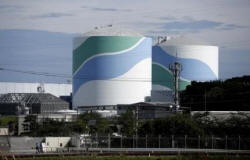|
 Japan
to restart reactor in test of Abe's nuclear policy Japan
to restart reactor in test of Abe's nuclear policy
 Send a link to a friend
Send a link to a friend
[August 10, 2015] By
Aaron Sheldrick and Issei Kato
TOKYO/SATSUMASENDAI (Reuters) - Japan is
due to switch on a nuclear reactor for the first time in nearly two
years on Tuesday, as Prime Minister Shinzo Abe seeks to reassure a
nervous public that tougher standards mean the sector is now safe after
the Fukushima disaster in 2011.
|
|
 Abe and much of Japanese industry want reactors to be restarted to
cut fuel imports, but opinion polls show a majority of the public
oppose the move after the nuclear crisis triggered by the earthquake
and tsunami in March 2011. Abe and much of Japanese industry want reactors to be restarted to
cut fuel imports, but opinion polls show a majority of the public
oppose the move after the nuclear crisis triggered by the earthquake
and tsunami in March 2011.
In the worst nuclear disaster since Chernobyl 25 years earlier, the
meltdowns at the Fukushima Daiichi plant caused a release of
radioactive material and forced 160,000 from their homes, with many
never to return.
The crisis transfixed the world as the government and the Fukushima
operator, Tokyo Electric Power (Tepco), fumbled their response and
took two months to confirm that the reactors had undergone
meltdowns.
Kyushu Electric Power said it aimed to restart its No. 1 reactor at
its Sendai plant at 0130 GMT on Tuesday (2130 ET on Monday).

The plant on the west coast of Kyushu island is the furthest away of
Japan's reactors from Tokyo, where protesters regularly gather
outside Abe's official residence to oppose atomic energy.
At nearly 1,000 km (600 miles) from the capital, Sendai is closer to
Shanghai or Seoul.
A successful restart would mark the culmination of a process whereby
reactors had to be relicensed, refitted and vetted under tougher
standards that were introduced following the disaster.
While two reactors were allowed to restart for one fuelling cycle in
2012, the whole sector has been shut down since September 2013,
forcing Japan to import record amounts of expensive liquefied
natural gas.
[to top of second column] |

As well as cutting energy costs, showing it can reboot the industry
safely is crucial for Abe's plans to export nuclear technology, said
Malcolm Grimston, a senior research fellow at Imperial College in
London.
"Japan also has to rehabilitate itself with the rest of the world's
nuclear industry," said Grimston.
At the Sendai plant, Kyushu Electric expects to have power supply
flowing within a few days if all goes to plan. It aims to start the
station's No. 2 unit in October.
Editing by Ed Davies)
[© 2015 Thomson Reuters. All rights
reserved.] Copyright 2015 Reuters. All rights reserved. This material may not be published,
broadcast, rewritten or redistributed.
 |